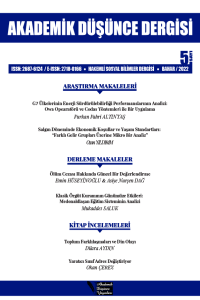HUKUKİ RETORİKTE ARGUMANLARIN GÜCÜ
Makale sistematik olarak hukuki retorik için argümantasyonun önemini sunacaktır. Her şeyden önce, bazı temel kavramlara ve argüman ve argümantasyon terimlerinin açıklanmasına özel önem verilecektir. Ardından, makalenin yazarının bu konulardaki bazı görüşlerini ve hukuki retorik ile bağlantılı olarak sunacağı argümantasyon teorisi sorununa döneceğiz. Hitabette aklın argümantasyonunun önemi üzerine bir tartışma yapılacak ve argümanların gücünün hukuki retorikte ne olduğu adli hitabet örneği üzerinden gösterilecektir.
Anahtar Kelimeler:
retorik, hukuk, argumanlar, toplukuk onunde konusma
THE POWER OF ARGUMENTS IN LEGAL RHETORIC
The paper will systematically present the importance of argumentation for legal rhetoric. First of all, special attention will be paid to some basic concepts and clarification of the terms argument and argumentation. Then we will turn to the question of the theory of argumentation, where the author of the paper will present some of his views on these issues, and in connection with legal rhetoric. There will be a discussion on the importance of argumentation of the mind in oratory, and show what the power of arguments is in legal rhetoric through the example of judicial oratory.
Keywords:
arguments, rhetoric, public speech, law,
___
- Aristotel. (2008). Retorika, UNIREKS, Podgorica.
- Avramović, S. (2008). Rhetorike Techne, Veština besedništva i javni nastup, Pravni fakultet Univerzoteta u Beogradu i JP „Službeni glasnik“.
- Enos, T. (1996). Encyclopedia of Rhetoric and Composition: Communication from Ancient Times to the Information Age, Routledge, New York.
- Fahnestock, J., Secor, M. (2004). A rhetoric of Argument, McGraw Hill, Boston.
- Freedman, M. H., Smith, A. (2004). Understanding Lawyers Etichs, Lexis Nexis, Newark.
- Freely, A., Steinberg, D. (2005). Argumentation and Debate, Thomson&Wadsworth, Belmont.
- Gardner, J. A. (1993). Legal Argument, The Structure and Language of Efective Advocacy, Lexis Nexis, Charlottesville.
- Grgić, S. (2016). Vizuelna argumentacija u oglašavanju, Filozofski fakultet Sveučilišta u Zagrebu, Zagreb. (napomena: diplomski rad)
- Groark, A. L., Tindale, C. W. (2008). Good Reasoiong Matters!, Oxford University Press, Oxford.
- Gupta, B. (1995). Perceiving in Advanta Vedanta: Epistemiological Analysis and Interpretation, Montial Banarsidass, Delhi.
- Hamblin, C. L. (1970). Fallacies, Methuen, London.
- Kišiček, G. (2010). „Pogreške u argumentaciji – Dvojbe u tumačenju i klasifikaciji“, Govor, XXVII (2), pp. 129-143.
- Klaić, B. (2012). Novi rječnik stranih riječi, Školska knjiga, Zagreb.
- Le Bon, G. (1920). Psihologija gomile, Tisak kraljevske zemaljske tiskare, Zagreb.
- Mayer, M., Carilho, M. M., Timmermans, B. (2008). Povijest retorike od Grka do naših dana, Disput, Zagreb.
- Mirković, J. (2014). Argumentacija u govorima društvenih pokreta, Filozofski fakultet Sveučilišta u Zagrebu, Zagreb. (napomena: diplomski rad)
- Nušić, B. (1934). Retorika: Nauka o besedništvu, Geca Kon, Beograd.
- Perelman, C. (1982). The realm of rhetoric, Universitiy of Notre Dame Press, London.
- Perelman, C., Obrechts-Tyteca, L. (1969). The new rhetoric: a treatise on argumentation, University of Notre Dame Press, Notre Dame.
- Petrović, S. (2007). Retorika: Istorija, teorija, praksa, Narodna knjiga – Alfa.
- Radonjić, R. (1999). Govorništvo, CID, Podgorica.
- Radonjić, R. (2006). Pravna retorika, Pobjeda, Podgorica.
- Schmidt, M. (1986). „On classifications of fallacies“, Informal Logic, VIII (2), pp. 57-66.
- Simović, M. N., Simović, V. M. (2016). Krivično procesno pravo, Uvod i opšti dio, Pravni fakultet Univerziteta u Bihaću, Bihać.
- Škarić, I. (2004). Skripta za mentore govorničke škole.
- Škarić, I. (2011). Argumentacija, Globus, Zagreb.
- Sloane, T. O. (2001). Encyclopedia of Rhetoric, Oxford University Press, New York.
- Tadić, Lj. (1995). Retorika, Uvod u veštinu besedništva, Filip Višnjić Institut za filozofiju i društvenu teoriju, Beograd.
- Thagard, P. (1983). „Fallacies of practical reasoning“, Informal Logic, V (1), pp. 26-27.
- Tindale, C. (2007). Fallacies and Argument Appraisal (Critical Reasoning and Argumentation), Cambridge University Press, Cambridge – New York.
- Tindale, C. W. (1999). Acts of Arguing: a rhetorical model of arguing, State University of New York Press, New York.
- Van Eemeren, F. H, Grootendorst, R. (2004). A Systematic Theory of Argumentation, The Pragma-Dialectical Approach, Cambridge University Press, Cambridge.
- Van Eemeren, F. H., Garssen, B., Krabbe, E. C. W., Snoeck Henkemans, A. F., Verheij, B., Wagemans, J. H. (2014). Handbook of Argumentation Theory, Springer, Dordrecht.
- Walton, D. (2005). Fundamentals of Critical Argumentation, Cambridge University Press, Cambridge.
- Weston, A. (1992). A Rulebook for Arguments, Hackett Publishing Company, Indianapolis – Cambridge.
- Zarefsky, D. (2014). Rhetorical Perspectives on Argumentation, Selected Essays by David Zarefsky, Springer, Cham.
- ISSN: 2687-6124
- Yayın Aralığı: Yılda 2 Sayı
- Başlangıç: 2020
- Yayıncı: Akademik Düşünce Enstitüsü
Sayıdaki Diğer Makaleler
COVİD-19 SÜRECİNDE TOPLUMSAL CİNSİYET EŞİTSİZLİKLERİ: BİRLEŞİK KRALLIK ÖRNEĞİ
THE E-SQUATTER: AN OUTLOOK ON THE DIGITAL DIVIDE
M. Kemal ÖKTEM, Mehmet TUNÇER, İrem Ece AKPİNAR, Buket KARPAT
NİYAZİ BERKES: YAŞAMI, ESERLERİ VE OSMANLI-TÜRK MODERNLEŞMESİ ÜZERİNE GÖRÜŞLERİ
HUKUKİ RETORİKTE ARGUMANLARIN GÜCÜ
KİTAP İNCELEMESİ: OSMANLI İMPARATORLUĞU’NDA REFORM, 1856-1876
ALTERNATİF FİNANSAL VARLIK FİYATLAMA MODELLERİNİN PERFORMANSLARININ ANALİZİ
